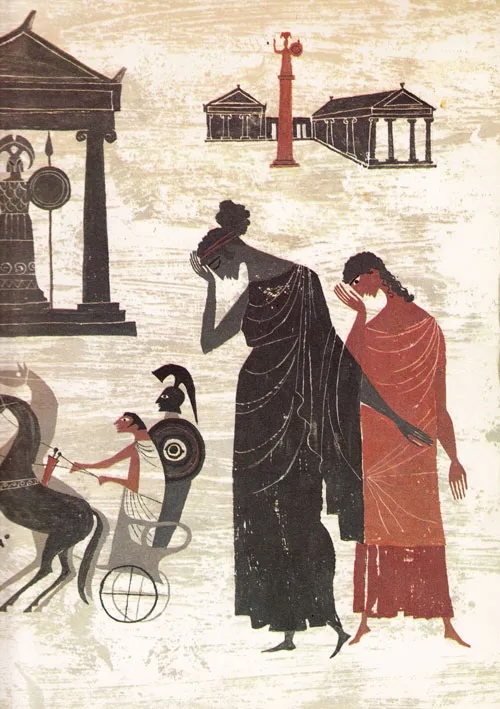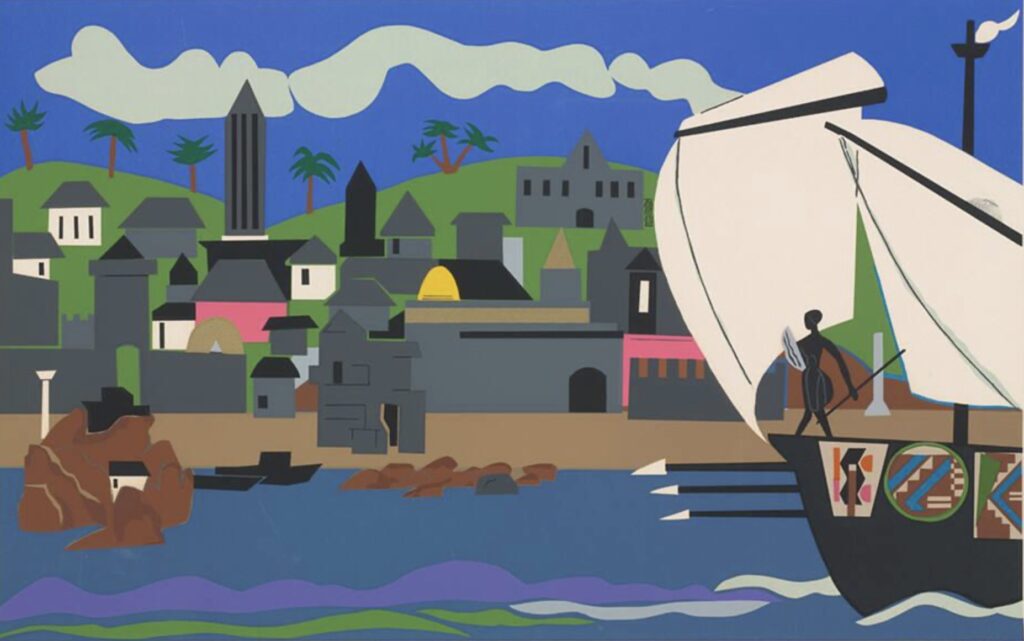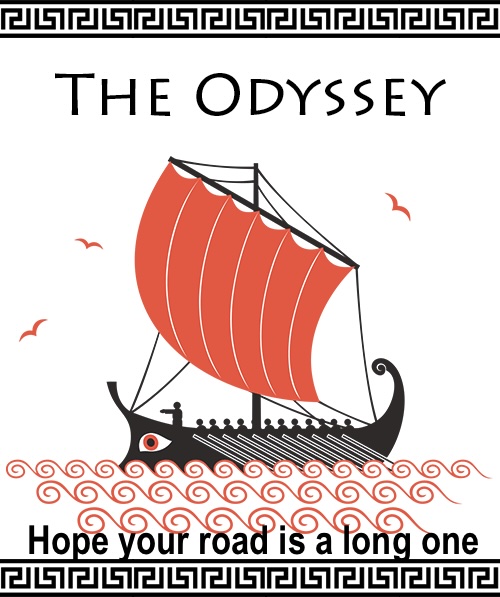
- January 14, 2024
- Emigration, Essay, Identity, immigration, Psychology, Social Philosophy, Sociology
An intimate reflection on learning, nostalgia, and liquid identities in the migratory context
“As you set out for Ithaca
hope your road is a long one,
full of adventure, full of discovery.
Laistrygonians, Cyclops,
angry Poseidon—don’t be afraid of them:
you’ll never find things like that on your way
as long as you keep your thoughts raised high,
as long as a rare excite
stirs your spirit and your body.
Laistrygonians, Cyclops,
wild Poseidon—you won’t encounter them
unless you bring them along inside your soul,
unless your soul sets them up in front of you.
Hope your road is a long one.
May there be many summer mornings when,
with what pleasure, what joy,
you enter harbors you’re seeing for the first time;
may you stop at Phoenician trading stations
to buy fine things,
mother of pearl and coral, amber and ebony,
sensual perfume of every kind—
as many sensual perfumes as you can;
and may you visit many Egyptian cities
to learn and go on learning from their scholars.
Keep Ithaca always in your mind.
Arriving there is what you’re destined for.
But don’t hurry the journey at all.
Better if it lasts for years,
so you’re old by the time you reach the island,
wealthy with all you’ve gained on the way,
not expecting Ithaca to make you rich.
Ithaca gave you the marvelous journey.
Without her you wouldn’t have set out.
She has nothing left to give you now.
And if you find her poor, Ithaca won’t have fooled you.
Wise as you will have become, so full of experience,
you’ll have understood by then what these Ithacas mean.”[1]
Here is the beautiful poem Ithaca by the Greek-Egyptian writer Constantine Cavafy. Indeed, the feeling, understood holistically, of a migrant cannot be expressed better or in such a beautiful way. Those of us who at some point have left our native abode behind understand well that Ithaca is much more than the Greek island of Ulysses, more than 117 square kilometers of land rising above the blue of the Mediterranean Sea. Ithaca is a precious stone, a territory familiar to the universal feelings and thoughts of the human being; it is the mother of all literary territories, the material from which dreams are built, the origin, perhaps, of utopia, the beginning, and the end of desires. Ithaca is the celebration of human nature, the human ability to overcome obstacles and achieve goals, the symbol of dreams that come true and the journey that must be taken to achieve them.

Was, perhaps, Ulysses the first migrant in history, the first nostalgic? Greek civilization, forced by battle and throughout its history to leave and return incessantly, treasures a fantastic fable on the theme of return, an entire epic built around the difficulty of return, the desire to return, and the nostalgia for the homeland. The myth of Ulysses, whose precedent is found in the plural of the Greek word nóstos, that is, nóstoi (the returns), a lyrical work that recounted the return home of the heroes who fought in Troy, is, undoubtedly, the return that has cast a more fruitful shadow over all subsequent literature, history, and philosophy. The pillars of a good part of our Western European culture are based on Ithaca and its Odyssey.
Each emigrant, each one of us, is a child of Ulysses, exiles from Ithaca, nostalgic for our land. Exile is a universal experience, as are the multiple feelings and knowledge generated by it. Thus, emigration is a round-trip teaching-learning process: there because we learn and back because we teach, starting because we long and returning because we yearn. It is permanent knowledge exercised from multiple dimensions: the affective, the cognitive, the evocative, the narrative, or the interpersonal and collective introspective. This combination of behaviors is why those of us who emigrate, whether outside our own region or internationally, learn to respect diversity, embrace and incorporate new cultures, take care of the new environment, adapt to changes, and overcome the crises inherent to these moves. To recognize our differences, respect variety, and live together in democracy and freedom.
We also learn to miss, live with distance and coexist with nostalgia, accept separation, know how to give up, and exercise resilience. We are, to a large extent, workers from dawn to dusk because we understand that the work ethic is also the social ethic to leave those who come behind us a better world than the one we lived in. Furthermore, we became permanent exchangers of nostalgia, as García Márquez expressed, who always referred to nostalgia as his traveling companion. Although nostalgia is partly a land of delusions and illusions, the role it plays in the life of the immigrant is fundamental, as psychologist Isaura Bohórquez points out, because it transports him to a past that returns attitudes such as being an entrepreneur, oxygenates his desires, his aspiration to continue living, magnifies his pride, and allows him to rescue his strengths, optimism and confidence that led him one day to risk what he knew to seek a better world.

But nostalgia is not always free of discomfort or suffering. Psychologically, nostalgia, the absence of the place, the past, or someone, what in Galician they call morriña, or in Portuguese saudade, all of them and many more meanings, have etymologically in nostalgia the combination of two human behaviors. In Greek, as we expressed before, nóstos is the return, and algia is the pain. That is, nostalgia is, at its origin, the pain caused by not being able to return. This last behavior is precisely associated with the Ulysses syndrome or emigrant syndrome, a term coined by the psychiatrist Joseba Achotegui, as that behavior of chronic and multiple stress, which, except in extreme cases, allows nostalgia to be normalized as part of emigration and as motivation to strengthen one’s own life. It could be said, therefore, that there is harmless nostalgia, which allows us to move forward, and harmful nostalgia, which paralyzes us. There is also an inoculated nostalgia that emigrant fathers and mothers instill in their children about what they left behind in their homeland. It almost always reflects a discontinuous memory, sometimes dissonant, extending that nostalgia as if they were recessive genes, as an imprint on their descendants. That is the nostalgia of the memory that emigrant parents have transmitted to their sons and daughters with a mixture of joy, romanticism, and pain. In my case, as an optimist by vocation, any favorable or unfavorable situation regarding nostalgia should be taken as learning to continue changing, improving, and transforming.
Migration is a school of life, a teaching that does not cease because it pushes us to update our personal story with each vital change: every time we reach a goal, when a child is born, when we move, when we write a book or when we enjoy the company of love, then that achievement leads us to review who we are, who we were or who we will become. So many times, I have asked myself, how many scraps of Miguel Ángel Escotet stitch together the skin that I inhabit? Or how many interim homelands make up the emotional map of my complexion? Or how many diasporas have taught me new languages and cultures, and how many have I approached the customs of my born country or my adopted countries?
In this sense, the Nicaraguan writer Gioconda Belli, with a long life of migrations and exiles and who knew well the experience of distributing identities between different worlds, concludes her memoirs by stating the need to: “live not one but several lives at the same time. Accepting oneself as a multiple being in time and space is part of modernity and the current possibilities of those of us who live in an era in which technology can be used as progress and openness instead of rejected as alienation. Human aspirations transcend geographical confines.”[2] Indeed, every human being lives, in a certain way, several lives delimited in time and sometimes also in space. A fact, the latter, that is accentuated in the case of those of us who have emigrated several times, which is why I was wondering, a moment ago and before you, readers, how many “I’m” and how many lands inhabit my skin.
Thus, León, Spain, is where I was born; Gijón and León, where I grew up; and Madrid, the one that welcomed the first university student I attended. Venezuela, Colombia, Argentina, France, and the United States are those second homelands in which I matured professionally and intellectually. Personally, the lands where I fell in love, built a family, and raised a home. This migratory experience has allowed me to broaden my life horizon, understand different realities, and be more open to diversity and multiculturalism, which is more difficult for those who remain in a single cultural universe. The fact of migration, in fact, is a question of identity that should not be valued as a dilemma between identity and detachment. It is not a choice between ascribing to the group of your ancestors or integrating in a depersonalized way into the new host society but as a sum positive between both positions.

Emigrating usually means assuming the option of fluid identities. We must overcome the consideration that people have a single fixed and exclusive identity throughout their entire existence because change is inherent to life, and identity is a flexible and liquid concept with great transformative capacity. The meaning of identity, as one of the Jungian expressions, is a dialectically dynamic archetype. They built on the now, on choosing what to do now and in the future. “I am not what happened to me; I am what I chose to be” [3] Carl Gustav Jung tells us. Both concepts, change, and identity, so profoundly rooted in emigration, drive evolution, growth, breadth of vision, a broad idea of the world, and tolerance. Interim cultures are, undoubtedly, part of us; they contribute to the formation of our individual identity, but they also contribute to constructing a social identity structure through interculturality. And this is so because, in that round trip, which I told you about at the beginning, the emigrant also brings his customs to the new social group in which he or she integrates. Emigrating implies expanding our social and individual identity.
Likewise, and aware that identity is a concept in constant construction and linked to culture and learning, another notable aspect that has to do with the interpersonal and not so much with the intrapersonal is the need for another when restoring identities. The human being flies alone. This social behavior does not happen in other species; sometimes, human beings do it with their close family group but never with their entire environment, and for this reason, they are required to occupy new roles, discover foreign places, and be looked at by other eyes and accepted as a participant in the society and culture that receives it. That is why identity in immigration always responds to the need to occupy a space concerning others, and it is linked to the internalization of various intersubjective relationships. It has to do with the intellectual place that we have settled for others, the one that has been assigned to us, the one that we have been able to play, the one that we have built in a particular culture. Places where they have welcomed us and from where they have thought of us and given us a name that identifies us, spaces that characterize our existence, and roles in which we recognize ourselves and are recognized. Identity always has its double side: the one that responds to how others see and define us and the one that refers to the subjective way we see ourselves.
 In the migratory experience, we are forced to let go of specific identifications in pursuit of new ones or re-identifications. Immigrants redefine identity in relation to receiving societies and places of origin. This implies a negotiation between the relationship we establish with others and the consequent delimitation of the individual’s place in one or another reference society. It is a complex process, and although it is not surprising that the feeling of losing anchoring points and confusion in the face of change can be present in migratory experiences, it is also true that identity presents a core invariant element that does not dilute after transcultural contact and that serves as a foundation for the re-identification work that needs to be carried out. The invariable is inherent to the migratory process, which never ends and becomes part of one’s immigrant identity.
In the migratory experience, we are forced to let go of specific identifications in pursuit of new ones or re-identifications. Immigrants redefine identity in relation to receiving societies and places of origin. This implies a negotiation between the relationship we establish with others and the consequent delimitation of the individual’s place in one or another reference society. It is a complex process, and although it is not surprising that the feeling of losing anchoring points and confusion in the face of change can be present in migratory experiences, it is also true that identity presents a core invariant element that does not dilute after transcultural contact and that serves as a foundation for the re-identification work that needs to be carried out. The invariable is inherent to the migratory process, which never ends and becomes part of one’s immigrant identity.
This entire social and individual process, which those of us who are people of the diaspora experience, is told quickly and said easily, but it is not experienced so fast, nor is it so simple, many times. It is true that the migratory condition is highly imperative because it entails a series of adaptive and learning demands at different social and behavioral levels, which, as I mentioned at the beginning, are perceptual, cognitive, and affective or emotional. This fact, although demanding, is extremely positive because it pushes us to exercise a series of skills and articulate a series of thoughts that we have not explored before. This forces us to innovate, take severe risks, be creative, and seek new perspectives and solutions. It drags us to educate solidarity, empathy, respect for other human beings and the environment towards the planet’s sustainability, as well as democratic coexistence and peace.
Since December 1976, I have returned several times to Spain. I have returned as many times to the places of adoption, mainly to my other homeland of the USA, exchanging nostalgia, and since 2014, as a good son of Ulysses, I have returned to Ithaca. Our emotional thinking is dichotomous upon returning from a long, infinite journey. We move between the emotion for the reunion with memory and the longing for what you left behind in your other homelands. But upon returning, we almost always find a new world since Ithaca, logically, is no longer the same, nor its places, nor its people, nor its customs, nor the romantic perception that you had of it, so you are forced to reconstruct your intimate personal history painfully. I found a land that fearfully lived on the threshold of our oblivion and my memory. I landed with a catalog of doubts on my forehead and a calendar of illusions on my chest.
Furthermore, I did not return to my native León, the Gijón of my childhood, or the Asturias of my parents. I settled in the Galician city of A Coruña, where I live today, but in any case, I preserve my emigrant soul and continue to honor all those countries and those cities and towns that live under my skin. Lands that are already part of me, my dreams, my memory, my process of maturity and old age, those interim homelands that opened their doors to me and that I learned to love. Places that, as Mario Benedetti says, “This is how one founds interim homelands, second homelands that were good when they made a place for us next to the fire and helped us look at the flames. This interim homeland is sweet and prodigious with warm hands that receive by giving (…) it is sweet and deep, little by little, we perceive its signs of the landscape and measure ourselves first with its clouds, then with its rages and glories. By getting used to their customs, we come to feel their bursts of history.”[4]
And with this good flavor that Benedetti’s profound and elegant words always leave, this emigrant who, like Cavafy, has already learned what Ithacas means, appreciates reading it.
References
[1] C. P. Cavafy, “The City” from C.P. Cavafy: Collected Poems. Translated by Edmund Keeley and Philip Sherrard. Translation Copyright © 1975, 1992 by Edmund Keeley and Philip Sherrard. Princeton University Press.
[2] Gioconda Belli (2005). El país bajo mi piel. Memorias de amor y guerra. Barcelona: Seix Barral, Pp. 408-409.
[3] Carl Gustav Jung (1964). Man and His Symbols. New York: Dell Publishing.
[4] Mario Benedetti (1976). La casa y el ladrillo. Madrid: Visor de Poesía. My own English Translation.
2024 © Miguel Ángel Escotet. All rights reserved. It can be reproduced, citing the source and the author. This article corresponds to the inaugural conference in its entirety, on the occasion of the celebration of the II International Congress of Centers of Castilla y León Abroad, Salamanca, Chapel of the Colegio Arzobispo Fonseca, University of Salamanca, on the thirteenth day of October and the year twenty-three. The original version in Spanish can be read here.